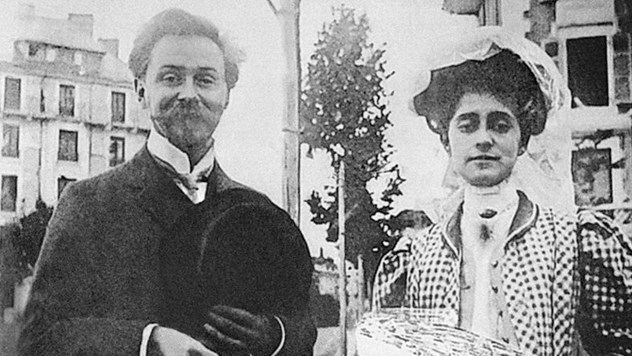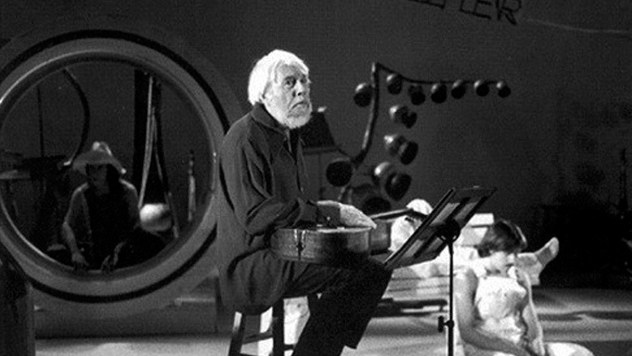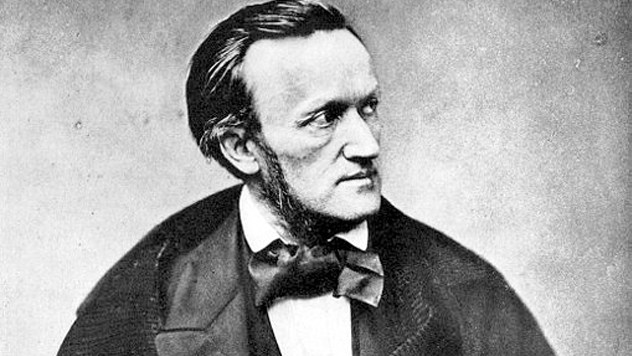Most of us listen to functions by best composers and wonder why we can’t be since brilliant. But could you desire their particular wizard if it meant obsessing about numbers or hanging out with demons?
The guys with this list have created some of the most beautiful and complex songs the whole world has ever before understood. Yet they certainly were troubled souls, whose eccentricities and obsessions resulted in some decidedly odd behavior.
10 Erik Satie
Ate Just Food Which Was White

Photo credit: Suzanne Valadon
The 19th-century French composer Erik Satie is best recognized for his piano collection, “Trois Gymnopedies.” But he additionally blogged works together with bizarre, comic brands, like “Authentic Flabby Preludes (For your dog)” and “Desiccated Embryos.”
Satie owned 12 identical gray, velvet matches, putting on only one over and over repeatedly until it wore away, at which time however start wearing another. At the time of his demise he however had six. He detested the sun’s rays, transported a hammer in his pocket for defense, and established their own church—the Metropolitan Church of Art of Jesus the Conductor.
Satie passed away in 1925 of cirrhosis for the liver. After their demise, their supporters found inside the house over 100 umbrellas, 84 handkerchiefs, and various letters, most of which he’d written to himself. One of these outlined his diet, which contains only foods that were white: eggs, sugar, shredded bones, pet fat, veal, sodium, coconuts, rice, pasta, turnips, chicken cooked in white-water, white cheese, cotton salad, and certain types of seafood.
9 Carlo Gesualdo
Witchcraft, Murder, and Masochism

The 17th-century Neopolitan composer Carlo Gesualdo had been a royal prince acclaimed for their chromatic vocal songs. But their compositions aren’t the reason he has got already been the topic of 11 operatic works and a 1995 Wernor Herzog pseudo-documentary called “Death for Five sounds.”
Gesualdo is the best known for the violent murder of their very first wife, who’d committed adultery with a cross-dressing duke. After their 2nd partner accused his very own two lovers of witchcraft, they were attempted for murder. The women confessed (under torture) that she had made Gesualdo take in the woman menstrual bloodstream. She more admitted that the other had encouraged the lady to just take a slice of loaves of bread, put it within her womb to saturate it along with her “seed,” and provide it to Gesualdo for eating with sauce.
Gesualdo finished his days afflicted by an imaginary horde of demons, whoever torments only stopped if twelve young men overcome him violently 3 x every day. Although the reason for Gesualdo’s death is uncertain, it really is believed he had been outdone to death during one of these simple masochistic frenzies.
8 Alexander Scriabin
Theosophy And Mysticism

The first 20th-century Russian composer Alexander Scriabin had been gifted with synesthesia, a rare neurological condition in which several senses intertwine. Scriabin heard songs as colors, and created an instrument that would be played like a piano to project colored light to the show hall.
Scriabin’s life was a continuous find an experience of Jesus. He involved with traveling experiments and once tried to walk-on liquid. After finding the theosophical teachings of brand new Age spiritualist Madame Blavatsky, Scriabin found believe their songs had been a bridge to mystical ecstasy.
In old age, Scriabin’s work expanded progressively dark. Their Seventh Sonata (the “White Mass”) purported to exorcise demons, while their Ninth (the “Black Mass”) had been about summoning them back into living Hell. Their last work would be to function as “Mysterium,” which will be done within the foothills associated with the Himalayas during a period of seven days. Bells suspended from clouds would summon the spectators, and perfumes appropriate to your songs would pervade the atmosphere. After the piece, society would dissolve in bliss, and humanity would-be changed by better, “nobler” beings.
Alas, before this final apocalypse could take place, Scriabin passed away of septicemia from an infected zit.
7 Harry Partch
Hoboism And “Corporeality”

Picture credit: Carnegie Hall
Partch, born in 1901, had an extremely uncommon youth. Their parents, previous missionaries, would sometimes buying prostitutes and hobos to pay the night. When he ended up being eight, his mommy had him circumcised, a meeting that reportedly left Partch traumatized.
Life changed whenever Partch found a novel on option tonal structures, which led him to be a self-described “philosophic music man seduced into woodworking.” Throughout the anxiety, he wandered as a hobo. He’d collect items such as artillery layer casings and old gas tanks, which he fashioned into musical tools, including the Chromelodeon, which had 43 shades in one octave.
Partch meant his works to be “corporeal”—ritual theater when the orchestra additionally sang and acted. Their work “The Bewitched,” for-instance, called for performers to portray a dropping women’s baseball staff inside bath, where they were to perform a wild dance for nude god Hermes (or their clothed television equivalent).
6 Richard Wagner
Cross-Dressing And Enemas

The great 19th-century German opera composer Richard Wagner suffered from erysipelas, or cellulitis, an infection which includes painful rashes and lesions. Wagner tried unsuccessfully to deal with the condition with twice-daily enemas, and therefore was the cause of their passion for satin robes and cushions.
Wagner’s letters to his milliner, but claim that the composer was almost certainly a cross-dresser. They contain demands for “graceful costumes” cut with lacy flourishes and other feminine variations, generally in green. These were basically for his third wife, Cosima (Franz Liszt’s illegitimate girl). But Cosima, a meticulous diarist, never mentioned all of them inside her reports. She even bought Wagner a pink carpet made from flamingo feathers for his 66th birthday celebration.
To encourage himself for their final opera, Parsifal, Wagner surrounded himself with rose-scented pink cushions and a bath filled with perfume. He died of a heart assault in Venice at age 69, clad, according to rumor, in a pink dressing gown.
5 Anton Bruckner
Numeromania And {A|TheA Love Of Skulls

Austrian composer Anton Bruckner endured numeromania, an obsession with counting things. He kept mindful listings of what number of “Hail Mary”s and “Our Father”s he recited every night, and composed his symphonies making sure that every club satisfied their own concealed numerical structure.
Bruckner was a hopeless intimate, whose infatuation with teenage girls resulted in an accusation of impropriety at college where he taught music. He made unsuccessful proposals of relationship to young girls all the way into their seventies, but he never married.
Bruckner additionally had anything for dead composers’ skulls. When Franz Schubert’s coffin was opened in 1888, Bruckner had been overcome with awe. He reached in and grasped Schubert’s head with both of your hands, letting go only once he was physically pulled away. This may not need already been so strange, had he maybe not done a similar thing a few months earlier in the day to Beethoven’s corpse.
4 Peter Warlock
Black Secret And Sadism

Photo credit: Jonathan Cape
Peter Warlock ended up being the pseudonym of good looking, hard-partying British music critic Philip Heseltine, whose life inspired for many movies and books, including D.H. Lawrence’s “Women crazy.” As he had beenn’t too busy smoking dope or composing crude limericks about various other artists, Warlock found time and energy to compose songs—over 200 by the time of their committing suicide at age 36.
Based on Warlock’s illegitimate son, art critic Brian Sewell, Warlock had been a “sexually voracious” bisexual sadist with numerous mistresses. Whenever one of is own girlfriends became pregnant, Warlock told her to own an abortion, an instruction Sewell’s Roman Catholic mommy declined. The two fought about this, and some times later on Warlock switched on the fuel and lay down, after very first putting his cat outside their household, apparently to save lots of it.
However, Warlock had made an other composer, Bernard van Dieren, his heir. Warlock’s legitimate boy Nigel Heseltine—the product of Warlock’s temporary marriage to an artist’s design nicknamed “Puma”—claimed that van Dieren had killed his daddy. But Warlock had endured despair, thin statements were overlooked, though even coroner couldn’t conclusively rule out murder.
3 Frantisek Kotzwara
Auto-Erotic Asphyxiation

He just composed one notable piece—“The Battle of Prague,” which merited a mention in Mark Twain’s The activities of Huckleberry Finn. However the 18th-century Bohemian composer Frantisek Kotzwara attained notoriety, nonetheless, by having among earliest recorded fatalities by auto-asphyxiation.
It happened in 1792 at a London brothel, in which Kotzwara had involved the solutions of a prostitute known as Susanna Hill. After dining with Hill and consuming a great deal of brandy, Kotzwara asked Hill to cut off his penis. When she refused, he requested the lady to hold him from a rope as they had intercourse being “raise their passions.” Maybe not desperate to drop a paying buyer, Hill performed as Kotzwara asked for, but apparently left him hanging too much time.
Hill ended up being charged with murder and tried at the Old Bailey. A sympathetic jury discovered the demise accidental and acquitted Hill associated with crime. A shrewd Hill cashed in on the experience by posting her memoirs. And a duplicate regarding the test transcript, these people were reprinted in a 1797 pamphlet, named “Modern Propensities; or, an Essay regarding the Art of Strangling.”
2 Arnold Schoenberg
Triskaidekaphobia

Picture credit: Florence Homolka
Arnold Schoenberg, the creator of 12-tone (atonal) music, experienced triskaidekaphobia, the irrational anxiety about the quantity 13. Born in Austria on September 13, 1874, he considered the day of their delivery an evil portent. When he realized that the title of their work “Moses and Aaron” included 13 letters, he crossed out the next “a” in Aaron making it 12.
In 1951, whenever Schoenberg had been 76, a pal jokingly remarked that the digits “7” and “6” total up to 13. Thinking greatly upset the composer, whom became persuaded however not endure their after that birthday celebration.
That July 13th—a Friday, because it happened—Schoenberg stayed in bed, nervous and ill adequate to call a health care provider. At 11:45 P.M., his spouse looked over the clock and said to by herself, “another quarter of one hour and also the worst is over.” A few minutes later on, a doctor called the woman in. Schoenberg’s throat rattled two times, their heart offered a robust beat, and then he died, as he previously feared.
1 Wolfgang Amadeus Mozart
Scatology And Cat Sounds

A lot was made from Mozart’s obvious fixation with defecation and farting, formally known as “scatology.” In another of his funnier letters, Mozart writes that a stink has entered the area. Whenever his mama implies that he’s farted, Mozart puts a finger up their backside after which sniffs it to ensure she’s appropriate.
Less distinguished, but usually Mozart liked to copy a cat. He’d be rehearsing an opera with his vocalists, whenever he’d instantly grow annoyed and leap over tables and chairs, meowing and turning somersaults. He also typed a comic song in which a lady responds to her husband’s questions with only meows, before the bad guy does not have any option but to-break down and meow, also. In English, the track is known as “The Cat Duet.”
Mozart loved wordplay and produced nicknames for their friends—Duchess Smackbottom, Countess Makewater, Princess Dunghill, and Prince Potbelly von Pigtail, just to name a couple of.
Some professionals have figured Mozart suffered from Attention Deficit Hyperactivity Disorder (ADHD). Other individuals believe he had Tourette’s Syndrome, an ailment often marked by copolalia (the obsessive or uncontrollable utilization of obscene language).
But whatever the reason behind Mozart’s unusual behavior, using one thing everybody agrees—Mozart ended up being a wizard, whose music nevertheless rocks the world.
